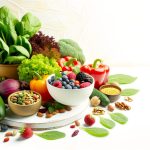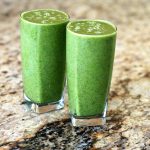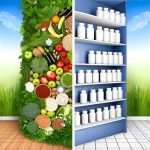You may have noticed that vegetarianism and the plant-based diet have become more popular in recent years. There are now more plant-based options on restaurant menus than there used to be. Restaurants that only serve plant-based food are becoming more popular among both omnivores and vegetarians.
Since the beginning of our history, people in America have been eating meat and potatoes as their main meal. However, nowadays it seems like people are looking for something different and better than that. Obesity, diabetes, heart disease, and other lifestyle-related ailments may be the result of many issues coming to a head.
Many of us spend most of our days and evenings sitting down in front of screens. This might be at our computers at work or at home in front of the television. Our lifestyles have become increasingly unhealthy, and we need to take action.
Many restaurants and even our own homes are full of high-fat, high-sodium, and high-cholesterol foods that are served in large portions. These foods only provide momentary satisfaction and can cause long-term damage.
This article will highlight some reasons to go plant-based.
1. Nonviolence Toward All Life
The concept of nonviolence towards all forms of life is one that has been present in many different cultures and traditions throughout history. For example, in the 13th century, Saint Francis of Assisi is quoted as saying “All praise be yours, my Lord, through Brother Fire, through whom you give us light. He is beautiful and radiant with great splendor, and he bears a likeness of you, Most High.”
If you have any men who will be cruel to any of God’s creatures, you will have men who will be cruel to other people.
The inconsistency of living peaceful and loving lives while taking the lives of animals for food is striking. It challenges our humanity. Can we really be compassionate when we are causing harm to other beings?
When animals are abused, could this lead to more abuse of animals and also humans?
Leo Tolstoy believed in the connection between slaughterhouses and battlefields. This is especially relevant today when considering the conditions of factory farms.
These days, small family farms aren’t common, and cows, pigs, and chickens are usually kept in enclosed spaces. They’re usually fed unnatural food and given lots of drugs.
The unsanitary conditions on factory farms are not only a potential source of disease, but they also provide an environment in which drugs that promote tissue growth and milk production can be effective.
The use of drugs in factory-farmed animals has accelerated their growth and productivity to an extent that their lives are now centered around being turned into food at the lowest cost possible.
Consider a quote by Gandhi, in which he claims,
The level of morality in a nation can be judged by the way it treats its animals.
2. Sustaining the Environment
What are the ethics of a plant-based diet? This is something that is often debated. There are many cost of animal life, that are often forgotten. Today we are more focused on “greening” our planet. This is seen in the messages that are sent out about saving the planet. Through many platforms such as T-shirts, billboards, and even in movies. So how does eating meat play into this message?
Today, factory farming accounts for 37% of methane emissions.
Fossil fuels emit a lot of carbon dioxide each year, which has a huge impact on global warming. Methane, in particular, has a much greater impact on global warming than carbon dioxide. Factory farms play a big role in this, as they use fossil fuels to grow feed and to raise animals for food.
Each year, deforestation for animal grazing and feed crops emits an estimated 2.4 billion tons of carbon dioxide globally.
Factory farms in the United States emit high levels of pollution, according to a study by the Environmental Integrity Project. The study found that some factory farms registered pollution emission levels well above Clean Air health-based limits.
Although there are environmental concerns, if the world stopped eating meat it would be the biggest step to ending starvation.
The following fact was reported by David Pimentel, professor of ecology at Cornell University:
If all the grain fed to livestock in the United States were consumed by people, nearly 800 million people could be fed.
And the words of Albert Einstein ring true:
A vegetarian diet is the best way to improve human health and increase chances for survival on Earth.
Livestock production is the primary driver of habitat loss, which in turn contributes to climate change, soil loss, water and nutrient pollution. Sixty percent of global biodiversity is lost as a result of clearing land for livestock production.
3. Our Health
Setting aside the welfare of animals and the environment, let’s focus on your personal health.
As far back as ancient Babylon, there were those who understood the benefits of a plant-based diet. The biblical story of Daniel and his friends, found in Chapter 1 of Daniel, is an example of this.
The plant-eaters were leaner, stronger, and faster. The first recorded “study” on plant-based nutrition is found in this chapter. Daniel and his friends were tested against the rest of their classmates who ate meat. The result? The plant-eaters were leaner, stronger, and faster.
Daniel and his friends are healthier and wiser than all of their classmates.
Not only did the ancient Greeks and Romans know the importance of a healthy diet, they also understood the value of it.
Hippocrates, someone who is considered to be the founder of Western medicine, said that people should use food as medicine. Many ancient philosophers were vegetarians or only ate a little bit of meat.
The vegetarian diet was originally called the “Pythagorean diet” after Pythagoras, a Greek philosopher, mathematician, and vegetarian advocate.
Your brain benefits from a plant-based lifestyle in many ways. Improved mental capacity and performance, heightened awareness of spiritual issues, and a clearer mind are some of the benefits you may experience.
Benjamin Franklin, who was often made fun of for his vegetarian diet, said that he was rewarded with “greater clarity of head and quicker comprehension.”
In the past, people only had access to natural and wholesome food, so that was all they ate. The author finds it ironic that now, when we have access to all sorts of food, we often choose to eat unhealthy food.
5. The Meat Substitute Market Tastes Good
The damaging effects of meat production and consumption have resulted in the creation of meat substitutes, with various new brands and products appearing on the market.
The majority of meat substitutes are plant-based, for example soy, peas, and lupine. Additionally, there is lab-grown meat and insect-based meat that is still in development, but it is getting close to being commercially available.
Vegetarian and vegan meat substitutes are made from a variety of plant-based ingredients, including tofu, tempeh, seitan, grains, beans, peas, and lentils. Many of these meat alternatives are soy-based.
Pulses are the edible seeds of plants that belong to the legume family. This includes plants such as peas, chickpeas, lentils, beans, and soy. Pulses are especially high in fiber and protein.
Legume alternatives are proposed to be the most effective way of making food consumption more sustainable.
Plant-based meat producers have been targeting vegetarians and occasional meat-eaters, but newer brands are hoping to appeal to consumers who eat meat regularly.
According to research, consumers who are in favor of meat prefer that meat alternatives resemble meat, while consumers who are in favor of meat substitutes prefer that meat alternatives not resemble meat.
For example, we have a lot of different options for meatless meat products. Meat analogues are a type of meat replacement that tries to taste and feel like real meat. They can be seen as interchangeable substitutes that would take the place of meat in a dish.
An example of a new generation meat analogue brand is Beyond Meat. Beyond Meat is a vegan meat analogue made out of pea protein. It also contains beet juice to give the patty the effect of juiciness and ‘bleeding’.
5. Plant-based Diet is the Single Best way to Reduce your Environmental Impact
The Ecological Footprint is a metric created by the Global Footprint Network that measures the amount of resources used by individuals, governments, and businesses against what Earth can renew in a year.
The biocapacity we need to support human resource demand is the result of the calculation. In 2020, we would need 1.6 Earths to sustainably support the amount of resources we use.
World Overshoot Day marks the day when humanity has consumed all of Earth’s resources for the year. On August 22, 2020, the world will be in “overshoot” – using more resources than can be replenished and emitting more carbon dioxide than can be absorbed. This state of affairs will continue for the rest of the year.
The agricultural industry is responsible for the majority of the ecological footprint, meaning that half of the Earth’s resources are used to power our food systems. The two main reasons for this are resource inefficiency and food waste.
Animal agriculture contributes a significant amount to greenhouse gas emissions when compared to other industries, with 18% of the total emissions coming from this sector. This is even higher than the percentage of emissions generated by the transport industry.
Animal products are important for sustainability, especially meat products. They are some of the most energy-intensive and ecologically burdensome foods to produce.
The expected increase in population and meat consumption suggests that the fight to end world hunger is far from over. It is estimated that by 2050, the world population will reach 9.7 billion and meat consumption will rise to 52 kilogram per person annually. This expected increase in population and meat consumption suggests that the fight to end world hunger is far from over.
30 percent of the total environmental impact caused by humans is contributed by food production. This is the opposite of how the future of human diets should look like.
The projections for future diets show that the current situation is not sustainable.
A research study found that a vegan diet could reduce a person’s greenhouse gas emissions by up to 70 percent. Another study found that a vegetarian diet could reduce a person’s greenhouse gas emissions by up to 50 percent. In monetary terms, these diets could avoid climate-related damages of $1.5 trillion.
Conclusion
Although it can be difficult to change your diet, it is important to realize that plant-based diets offer more innovative products and alternatives. Try out some of our favorite meat replacements like tofu, seitan, and tempeh. You might be surprised at how easy it is to get used to once you get started.
A common belief is that it takes 21 days to develop a new habit. After a short amount of time, you won’t even notice that you’re craving animal products.
A plant-based diet is a lifestyle that is as compassionate, as conscientious, and as healthy as possible.









